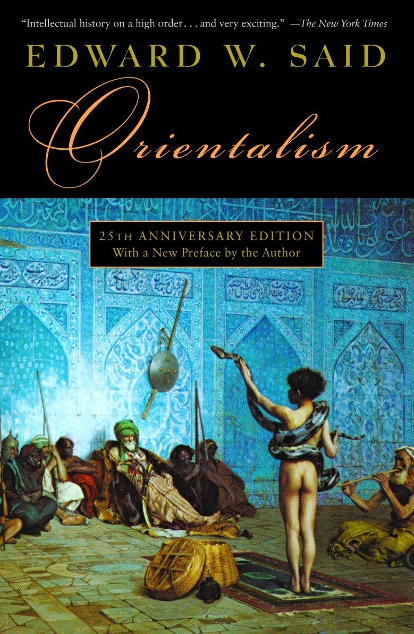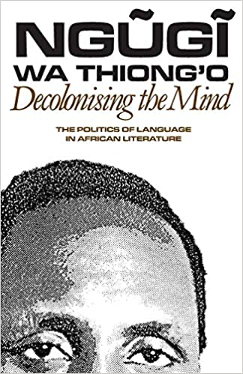[On Tuesday, October 13, 2020, Dr. Jenny Sharpe presented a lecture on Postcolonial Theory as part of the Modern Critical Theory Lecture Series. Below is a response by Ji Hyea Hwang (Comparative & World Literature, UIUC).]
Postcolonial Theory and Western Humanism
Ji Hyea Hwang (Comparative & World Literature, UIUC)
In this lecture, Sharpe provided an overview of postcolonial theory and its relation to Western humanism. She mainly highlighted the work of Edward Said, Gayatri Chakraborty Spivak, and Sylvia Wynter, while also introducing contemporary critiques along the way.

Edward Said’s 25 th Anniversary Edition of Orientalism
Beginning with a discussion of the 25 th anniversary edition of Edward Said’s Orientalism, Sharpe explained how this founding text of postcolonial studies not only played a key role in establishing colonial discourse analysis, but also connected the past and the present to raise the question of whether “modern imperialism ever ended.” In this new preface, Said proposed a new humanism, which Sharpe labeled as a “worldly, secular humanism,” to argue that humanism is the only resistance against the inhumane practices of human history. Said called for humanistic practices that engaged in worldly, cross-cultural interpretation. His arguments resonate with Fanon’s new humanism with its emphasis on human agency. Sharpe explained that in order to reconcile Fanon’s call for a new antiracist humanism, which provides agency to the subalterns, with Said’s worldly secular humanism, we must understand Dipesh Chakrabarty’s project of provincializing Europe. Chakrabarty does not argue that we must reject European thought, but rather acknowledges that the post-Enlightenment ideas which informed postcolonial theory are indeed indispensable to understanding the non-West. In this vein, she suggested that we must provincialize Europe to explore “how [European] thought—which is now everybody’s heritage and which affects us all—may be renewed from and for the margins” (16).In other words, Sharpe argued that we must treat the universal claims of secular humanism as being local.
Gayatri Chakravorty Spivak is the only female and literary scholar of the Subaltern Studies Collective, whose members read British colonial and Indian nationalist texts in order to “find a place for the unrepresented subjects of history” and “represent” the subaltern consciousness. Sharpe noted that Spivak in “Can the Subaltern Speak” critiques both liberal humanism and French poststructural anti-humanism. In her essay, Spivak notes that it is difficult for the Subaltern Studies project to recover female voices because of an absence of records for these women, and because the race and gender hierarchies in the colonies make it impossible for them to speak. Sharpe pointed out that Spivak asks what language is even available to subaltern women to “know and speak their oppression.” In addition, Sharpe explained that the subaltern woman is caught between object-formation within British colonizing discourse and the “Hindu manipulation of female subject-constitution.” In discussing how the treatment of sati serves as an example of how the Indian woman “disappears…into a violent shuttling” between dichotomies, Spivak explains that on the one hand, “white men, seeking to save brown women from brown men, imposed upon those women a greater ideological construction” as the British officials’ abolition of sati constrained the women’s choices while at the same time claiming to grant them free will. On the other hand, Hindu patriarchal discourse claims the woman has agency in sacrificing herself through self-immolation, by her own free will.
During the first round of Q&A, Sharpe responded to questions from the audience by locating them in broader discussions about the field and its key terminology. One of the questions from Prof. Ali Behdad of UCLA was about the shift away from postcolonial studies to world literature and global anglophone studies in recent times. Sharpe expressed her concern for such unifying terms, claiming that they are “huge problems” for the field because they remove discussions of power structures and hierarchies that inform postcolonial studies. Sharpe explained that world literature is what postcolonial studies was critical of, as it reproduces “the very totalizing structure of both colonialism and now globalization.” She emphasized the difference between various strands of colonialism, such as settler colonialism, territorial colonialism, and plantation colonialism, arguing that each has its own form and distinction that cannot simply be replaced with broader descriptions such as “world” or “global” anglophone.
Sharpe then discussed the concept of postcoloniality. She noted that the “post-“ in postcolonial does not suggest the demise of colonialism, but rather indicates the period that is the aftermath of colonialism. As an example of postcoloniality, Sharpe brought up the Orientalist depictions of Arabs and Islam that guide U.S. foreign policy today. In her two essays, “Is the United States Postcolonial?” and “Postcolonial Studies in the House of US multiculturalism,” Sharpe further explores how the remnants of colonialism persist today in the United States, but also discusses her own decision to pursue postcolonial studies while simultaneously aware of “the institutional demand for diasporic third world scholars to teach the literature of former colonies.”

Ngũgĩ wa Thiong'o’s Decolonising the Mind
In the second part of her lecture, Sharpe also introduced the term “decolonial,” which she suggested emerged as an alternative to “postcolonial” in the work of Walter Mignolo, who got the term from Ngũgĩ wa Thiong'o’s Decolonising the Mind. Mignolo turned to the decolonial in order to dissociate the term from Western epistemologies such as post-structuralism and deconstruction. Similarly, Ngũgĩ wrote Decolonising the Mind in response to the postcolonial state’s failure to break free from colonial hierarchies. Having experienced the oppression of his mother tongue as a schoolchild, Ngũgĩ insisted on writing in his mother tongue and insisted that African languages needed to be written down and produced as literature. Sharpe additionally explained that Gramsci introduced the term “subaltern” to refer to “both subordinate classes and subordinated forms of knowledge in order to overturn the Marxist ideas of intellectuals being at the vanguard of revolutions.” She noted that this is where the idea of “decolonial” becomes useful, in that it tries to break through frames of reference that shape our view of certain forms of meaning.
Sharpe then shifted to Sylvia Wynter, and her essay, “The Pope Must Have been Drunk, The King of Castile is a Madman.” As Sharpe noted, Wynter shows the clash of world views in the Cenù Indian-Spanish exchange and how it extends to the modern era. This essay was originally published in 1995 and parallels the Spanish Requisition with the crisis of the Caribbean. The essay explores the conflict between the Cenù and Spanish understanding of the Requisition in that the Spanish Judeo-Christian declaration of ownership of the land is simply incoherent to the Cenù people. Wynter explains the tautological nature of the Requisition’s narrative by showing that the objective mode of truth for the Spanish, which normalized the Spanish colonization, needs to be localized and restricted to 16th century Europe in order for it to hold true. To the Cenù people, the narrative was incomprehensible. Wynter then turns to Haiti, 500 years later in time, claiming that history was repeating itself. She points out that the American occupation of Haiti (1915-1934) was driven by the need to stabilize Haitian politics for the benefit of private foreign investments within the present hegemonic cultural system of capitalism. Wynter identifies the racism and elitism behind the US intervention, pointing out how this benefited the Westernized Haitian elite, in opposition to the Vodounist peasantry and agro-proletariat. She argues that the overt color line racism was “culturally prescribed” by the then understanding of man’s humanity, and that the movement of Indigénisme, which she explains to be largely “African-derived,” arose in response to it. She explains that Indigénisme was deemed to be irrational and an antithesis to the rational logic of contemporary Western thought, a clash which parallels the clash between the Cenù and the Spanish. Sharpe pointed to the last sentence of Wynter’s essay, “And the maps of spring always have to be redrawn again, in undared forms,” arguing that it intersects with Spivak and Said in terms of “talking about the place of the imagination in breaking the kinds of system of meaning that they seek to do.” She concluded the talk by claiming that as Wynter suggests, we must continuously redraw and reimagine our “cartographies of hope and desire,” and be able to not only imagine new worlds to come, but also view the past through perspectives with attitudes like that of the Cenù, who saw the Papal bull of 1943 as having been written by a drunkard at the request of a madman.
The final round of questions helped identify crossovers and connections between the theories and ideas that Sharpe delineated with other theories. One such question: “Are there any parallels between decolonial and feminist theories, and do they intersect in positing alternate frameworks of knowledge as a form of resistance against Western or dominant epistemology?” Sharpe answered yes, definitely, and brought up the example of Chicana writings of the 1980s, which were critical of Western feminism, as these writings were very much embracing the decolonial perspective. She explains that feminists of color find themselves in situations similar to that of Ngũgĩ, who, as an intellectual, was also organically connected to the community about which he was writing when he wrote Decolonising the Mind.